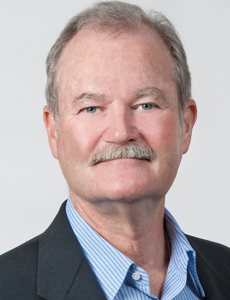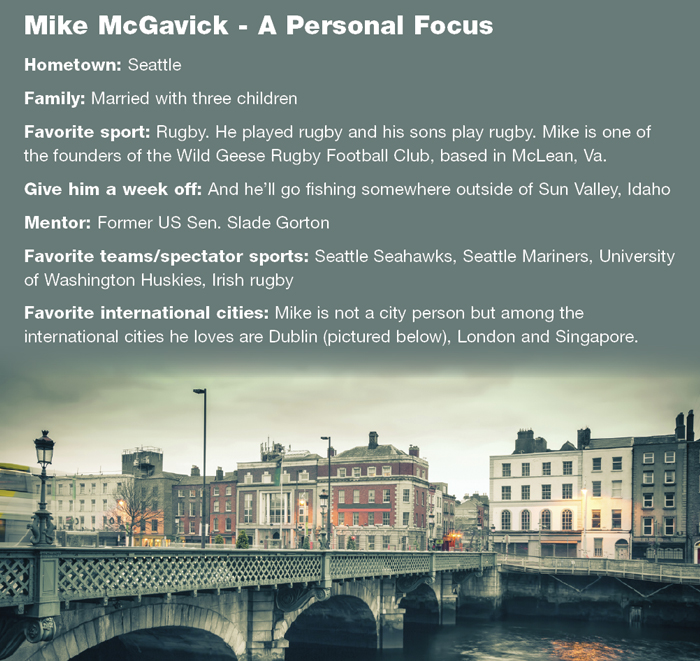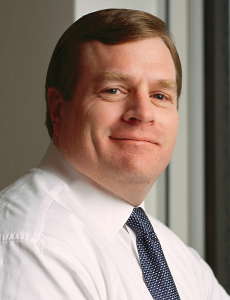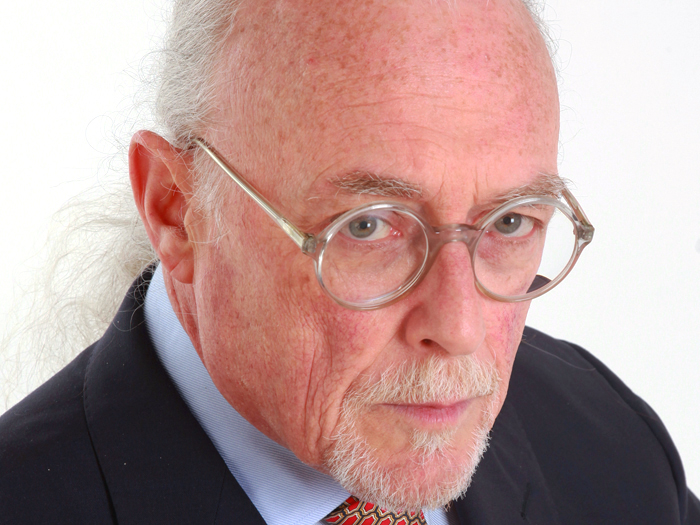R&I Profile
Quick and Decisive
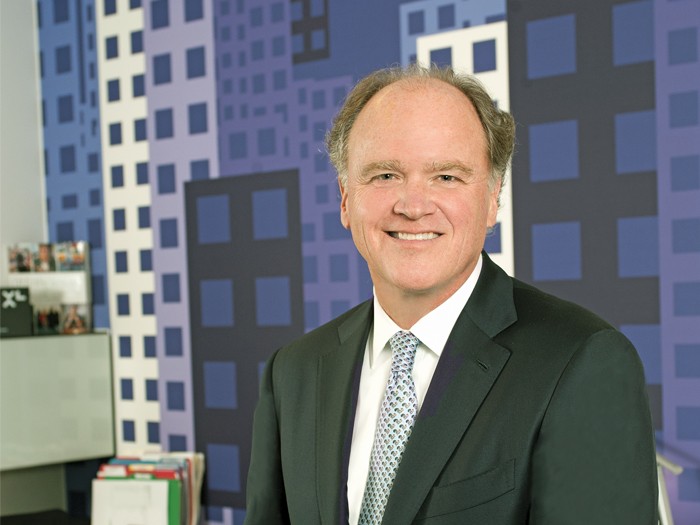
With the announcement that XL Group plc bought Catlin Group, the global P&C (re)insurer that operates the largest syndicate at Lloyd’s, XL Catlin CEO Mike McGavick can say that he’s plucked a plum.
It’s a prize the former rugby player won by absorbing hard hits and staying on his feet.
Dublin-based XL closed on the $3.93 billion acquisition of Catlin on May 1. According to experts, the purchase will combine deep benches in Bermuda and London, and position XL Catlin to be a top 10 global reinsurer and a global force in specialty insurance.
“We’re going to be darn hard to ignore. That’s meaningful to us,” McGavick said.
McGavick and XL bought Catlin from a position of strength. XL averaged a combined ratio of 92.3 over the past three years and recorded operating net income of almost a billion dollars in 2014.
“Communication, in my mind, is the least fully appreciated of the management arts. That’s a bias that I’ve developed over a long, long time.” — XL Catlin CEO Mike McGavick
Credit McGavick’s leadership, because when he became CEO in May 2008, XL was reeling.
McGavick said he knew when he took the job that the company had problems. What he didn’t know was how widespread they were.
In 2006, XL spun off a financial guarantee business, Security Capital Assurance, (now known as Syncora Capital Assurance) that suffered huge mortgage-backed securities losses in 2008.
XL’s exposure to those losses as a reinsurer as of mid-2008 was more than $67 billion. To put that exposure in perspective, XL’s assets at year-end 2008 were $45.6 billion.
With the blessing of the New York Department of Insurance, McGavick negotiated a commutation agreement with SCA that reduced XL’s exposure to around $1 billion.
But the problems didn’t end there. With the financial crisis in full roar, XL next faced heavy losses due to its own investments in mortgage-backed securities.
No sooner had the company worked to rectify those problems when the soundness of its underwriting came into question. With barely a minute to catch their breath, McGavick and his team then turned to face that issue.
Three massive problems, all handled in quick succession.
Elliott Bundy, McGavick’s assistant and XL’s chief communications and marketing officer, said McGavick’s strength as a communicator is one of the keys to the XL turnaround.
“He is very respectful of his audience,” Bundy said. “He wants everyone to understand what it is we are really trying to do, particularly what we want to do together.”
“Communication, in my mind, is the least fully appreciated of the management arts,” McGavick said. “That’s a bias that I’ve developed over a long, long time.
“Leaders can have any number of ways they choose to communicate. What they can’t do is they can’t delegate responsibility for the fact that there is effective communication.”
McGavick communicated well, but he also acted decisively, according to a veteran insurance industry leader.
“Michael came in and he didn’t flinch. He had to do what he did and he did it with speed,” said Brian Duperreault, CEO of the Hamilton Insurance Group.
Duperreault, like many other leaders who have faced steep challenges, was watching McGavick back in 2008 to see how he’d do.
Some say the biggest challenge McGavick faced at XL in 2008 was a crisis in confidence.
“He shored up confidence and he got people to believe in XL. That’s certainly a big part of it,” said Cliff Gallant, an insurance industry analyst with Nomura Securities.
Making big changes when an organization is in difficulty means telling the unvarnished truth and that’s what McGavick did, Duperreault said.
“You can’t get people to buy into a secret,” said Duperreault.
Roots
McGavick is now an established insurance leader, but public service also flows in his veins. His dad Joe McGavick was a state legislator in Washington and served on the state’s liquor control board.
McGavick got one of his first major lessons in self-sufficiency when his father convinced him to attend the Seattle Preparatory School. A good Jesuit education had been good for him and it was the best thing for his son, Joe McGavick reasoned.
What Joe didn’t tell Mike was that he expected him to pay his own way.
Every paycheck Mike McGavick earned in high school was garnished by his father to cover tuition expenses, leaving Mike just a few bucks in pocket money. Perhaps that early lesson hardened him for some tougher cost-cutting decisions later on.
Another consequence of Joe McGavick’s training was that by the time Mike McGavick entered the University of Washington, he was out of the house and supporting himself.
“I became an incredibly independent cuss,” McGavick said.
True to his genetics, in his early professional life McGavick worked for a public policy roundtable in Seattle and later served as the chief of staff to Washington State Sen. Slade Gorton, whom he counts as a mentor.
McGavick started with Gorton as a driver. As they crisscrossed the state, traveling from fire halls to churches and other meeting places, McGavick gradually worked up the nerve to engage the senator in conversation. Once the senator started talking, McGavick kept his ears open and picked up what he could.
One of the key lessons McGavick remembers from Gorton is the importance of true root-cause analysis.
Don’t just come to conclusions that fit your preconceived notions, the senator taught McGavick. Dig into the problem and discover its essence.
“He deeply shaped how I think about the world,” said McGavick.
Insurance Calls
Mike McGavick’s entrée into insurance came about through his passion for public policy.
From 1992 through 1995, McGavick worked with the Superfund Improvement Project for the American Insurance Association in Washington, D.C. That work led to a job with CNA.
McGavick rose through the ranks there to become president and chief operating officer at CNA Financial, then the company’s largest operating unit. CNA Financial was plagued by inflated expenses, which McGavick addressed.
Hired by the Seattle-based personal lines insurer Safeco in 2001, McGavick again moved up, becoming president, CEO and chairman. And again he faced legacy problems.
“In many of the situations I solved, there was an absence of will to make decisions that are fairly obvious,” McGavick said.
“Too many of the strategies I saw were a hope that the problem would go away or that you could overwhelm it with good stuff.”
Before McGavick’s time, Safeco purchased American States, a life insurance business. When he became CEO, McGavick made the decision to unwind the American States deal.
The turnaround meant reductions in payroll. As anyone who’s done it knows, letting staff members go comes at a personal cost.
“You spend a little bit of your humanity with every job that you cause to be lost,” McGavick said.
As quickly as he turned around the three insurers, McGavick believes he could have acted more quickly.
“You learn that a lot more suffering comes from an unwillingness to do hard things. And even learning it you tend to be not quite as fast, as in retrospect you wish you would have been. All the big mistakes are in that bucket,” McGavick said.
Nomura’s Gallant said that McGavick showed backbone in doing what he did at Safeco.
“He said Safeco doesn’t need to be in this life business and he got rid of it. He said a big mistake was made in trying to do this and we have to let it go.”
“The right decisions always look like the easy ones in the rearview mirror,” said Greg Case, president and CEO of Aon and a McGavick admirer.
“Rarely do insurance leaders get credit for having the courage to return a company to its core business,” Case said.
“That was the case at Safeco. Mike inherited a business that had gone through a period of rapid M&A and lost sight of its core. It took real conviction and operational discipline to turn that around. But that is what the industry has come to expect from Mike and his team,” Case said.
McGavick said that at CNA, Safeco and XL, he discovered a formula. It wasn’t a formula he had in mind going in, but it turned out to be applicable in the case of each troubled company.
“You go in there and you try to learn to be humble and focus on two things. What is the real problem and what are some possible solutions?” McGavick said.
The team that will evolve will be comprised of three groups, he said.
“A third will be people who are in the right job and doing a good job and who are retained and become critical friends and advisers. There’s another third who were trapped under poor leadership, but in fact knew the place was falling apart and had some ideas about how to fix it,” he added.
“The other third you’re going to have to recruit.”
In 2006, showing that his taste for politics never ebbed, McGavick left Safeco to run for the U.S. Senate as a Republican. He lost the race.
“When he ran for office in Washington it wasn’t a surprise for me because you could tell he’s a gifted leader. For the insurance industry, it’s good he lost,” Gallant said.
XL Catlin
Mike McGavick is clearly excited about the XL Catlin deal. He’s so excited that he slapped a conference table several times during an interview in Stamford as he talked about what the new company is capable of.
“There are things that the combined company can do for clients that we couldn’t do before. Some of them are obvious,” McGavick said.
One of the obvious pieces is the increased capital the company will be able to align against risks.
“There are also skills that we bring that are formed differently at each company and combined, we believe, will yield a real depth of insight.”
Across the industry, specialty insurance is attracting talent and capital for a number of reasons. Risk is evolving rapidly. Specialty is the place where innovative products emerge and it’s a place where premium growth is substantial.
“Our clients’ risks are evolving rapidly. And we should expect that. That’s the world we live in,” McGavick said.
“If we’re going to have an organization matching this rate of change — in an industry that is very poor at innovation — we’re going to have to be deeply in the specialty spaces because that’s where solutions tend to emerge first.”
That’s why Catlin, in its position as the leading insurer at Lloyd’s, the global epicenter of specialty insurance, made so much sense as a partner.
“I upgraded the stock on the day they announced the deal, so I like it,” Gallant said.
Gallant relates that XL and ACE, whose offices in Bermuda are virtually side by side, were both seen as future powers when they were formed.
XL lost ground against its rival because it needed to tend to its problems back in 2008 and in subsequent years. While XL was on the mend, ACE flourished and achieved that early promise.
Gallant views the Catlin deal as XL’s chance to catch up and become a global leader.
“Catlin really pushed them into that category,” Gallant said.
“They’ve got the Lloyd’s business which puts them in every market in the world. So I think the combined company re-establishes XL as one of the top insurers in the world.”
“ACE was well positioned and we were horribly positioned,” McGavick said. “We lost a couple of years and ACE took advantage of those years and a big gap emerged.
“We’re closing a big chunk of that gap.”

